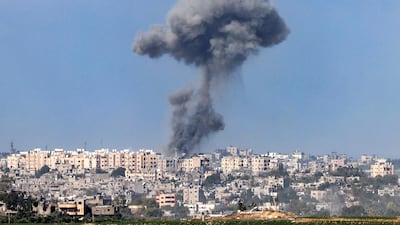Israeli ministers promised a severe response against Palestinian group Hamas on Thursday as criticism mounts of the government’s chaotic response to the unprecedented attack launched by the group on October 7.
The Hamas-led operation claimed the lives of more than 1,300 Israelis and led to more than 200 being taken hostage.
Palestinian health authorities say 3,785 people have been killed in Gaza since Israel began heavy bombardment in response to the attack.
Israeli Minister of Economy and Industry Nir Barkat said on Thursday at a press conference in a bunker in the southern city of Sderot, which saw some of the worst fighting, that “Israel and the free world has to wipe Hamas off the map”.
“If Hezbollah and Iran [enter the war], we will wipe them off the map as well,” he added, as Hamas rockets were intercepted overhead.
Agriculture Minister Avi Dichter said at the same conference that on October 7, Hamas “practically signed the death certificate of the organisation”.
He also described the raid as a “hunting attack, but instead of animals, they hunted people, babies, children, women, men, [the elderly], soldiers, whatever”.
For many in the group of Israelis who talked to The National, the events of October 7 remain seared into their consciousness and time has not dimmed their belief that the military still needs to send troops into the Gaza Strip.
“First of all, as a show force and to scare off Hamas and maybe collapse Hamas,” said Avichai Ross, 25, who recently returned from travelling across Europe.
Mr Ross said he believed it was important for the military to not send in troops immediately and to allow a little distance and perspective.
“It's good that they take time so they can think rationally,” Mr Ross told The National.
“There is a sense that we have changed a phase in our presence here as a country in the Middle East,” said Dan Avnon, a professor of political science at The Hebrew University of Jerusalem.
“A lot of people feel that if we, the State of Israel, do not show our neighbours close and far that if they push us then they get something that will cause everyone else to gasp in horror and not mess with us.”
The country's government has released a string of statements decrying the actions of the militant group. They include Prime Minister Benjamin Netanyahu telling US President Joe Biden last week that Hamas is worse than ISIS.
Mr Netanyahu has come under intense and mounting criticism for not speaking to the press in the 13 days that have passed since the attack.
“Let him do his job,” Mr Barkat said, in response to a question about the prime minister’s lack of media engagement. “He’s doing the right thing [by] working with Israeli security forces to make sure we win the war.”

Mr Barkat’s defence came a day after the families of some Israeli hostages slammed the government’s decision to permit Egypt to transfer aid into Gaza – following pressure from President Biden – without securing concession for the hostages.
“We remind you that children, babies, women, soldiers, men and the elderly … are being held underground like animals without any human conditions, and the government of Israel is treating the murderers to baklava and medicine,” said members of the Bring Them Home organisation, which advocates for hostages and their families.
Family members said they would “intensify their struggle in the near future” if the plan went ahead.
There are also signs that appetite for a severe military response in Gaza is waning among some Israelis.
On Thursday, Hadas Kalderon, whose two children were kidnapped, pleaded with Hamas and Israel to halt all military activities and to let her remaining family go.
“All parties should stop immediately,” Mr Kalderon said. “Any military operation must stop until they release the children and babies.”
Ms Kalderon joined other families of Israelis kidnapped by Hamas at a press conference in Tel Aviv where they pleaded to the world for help and to their government to keep their loved ones in mind before commencing any type of military invasion.

“We have 203 hostages still there,” Ms Kalderon said. “How can you still fight? They are in the middle of the war.”
Gerald Steinberg, an Israeli political scientist, told The National that there is still overwhelming support for a ground invasion, saying: “The goal of demilitarising Gaza remains firm, and this will require major Israeli presence on the ground, as reflected in statements made during President Biden's visit.”
“The timing and other details are unclear, and depend on the degradation of the terror infrastructure that can inflicted from the air,” he added.
“At this point, Israeli society at large appears to firmly back the IDF and government and is preparing for a long conflict.”

